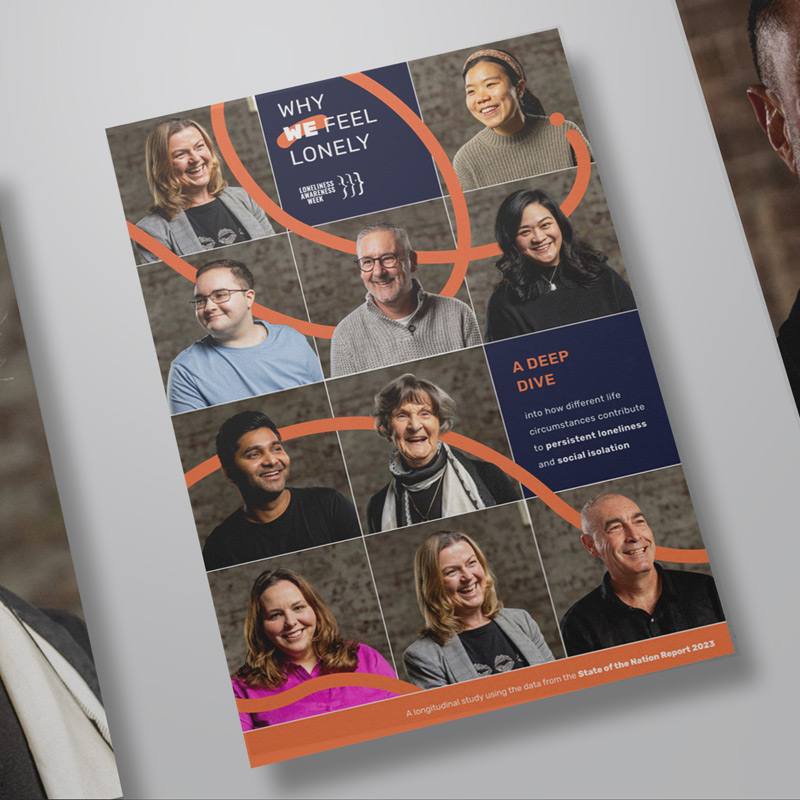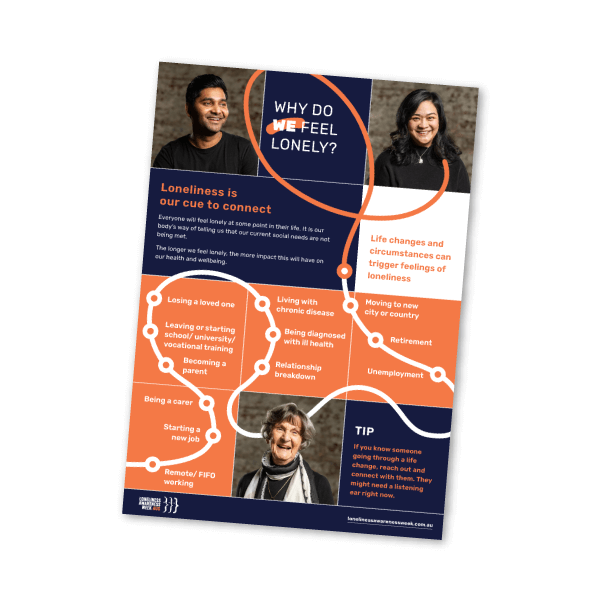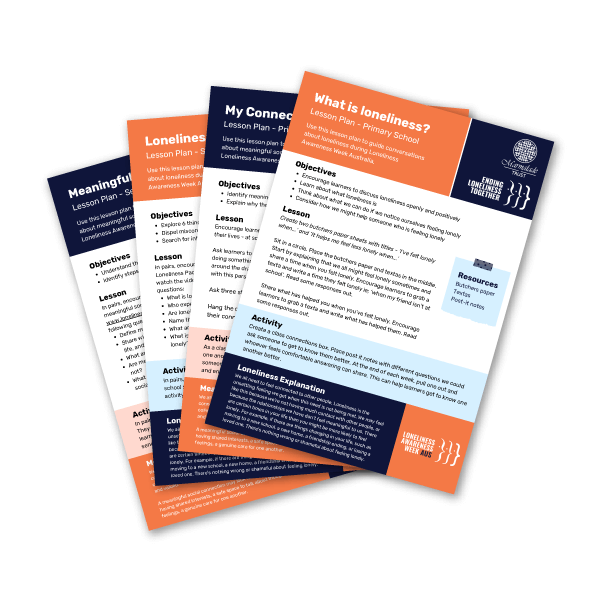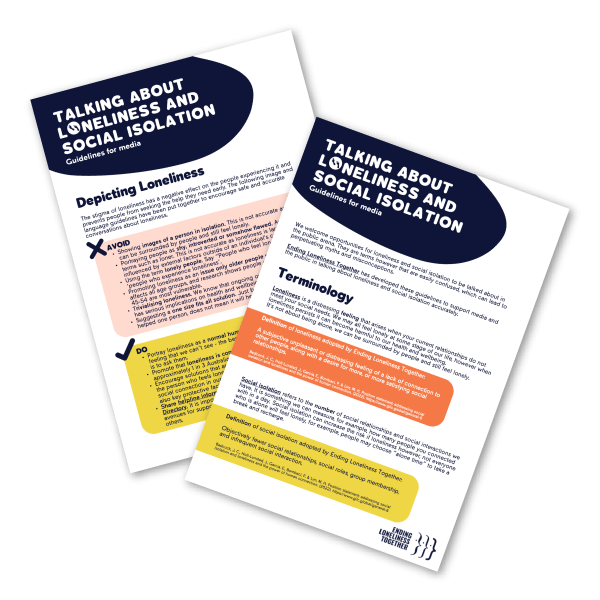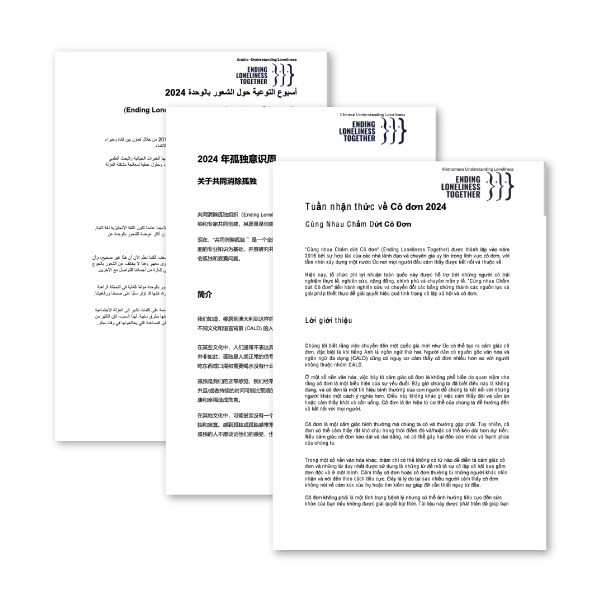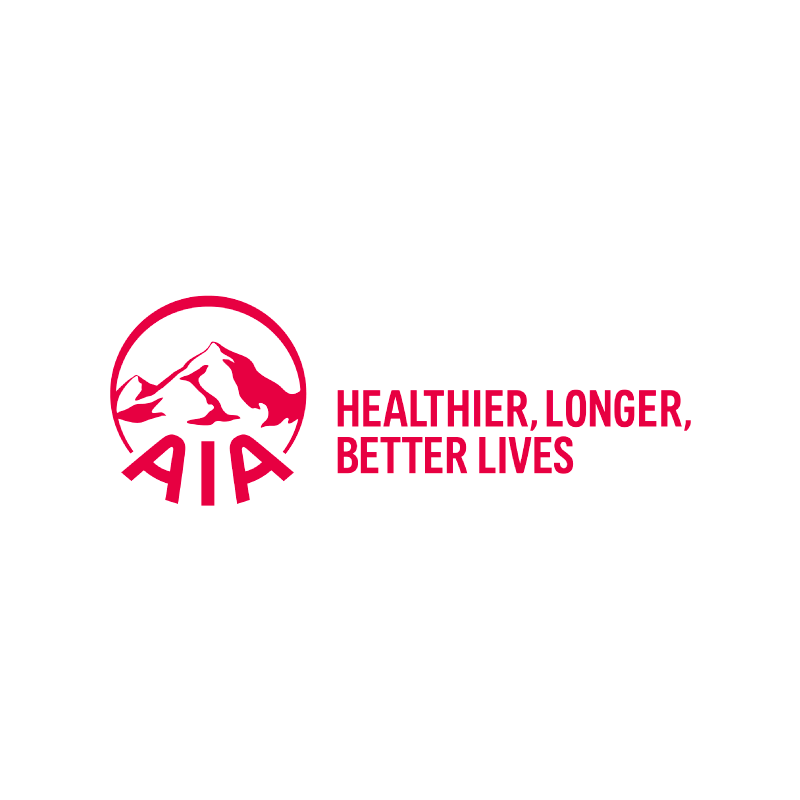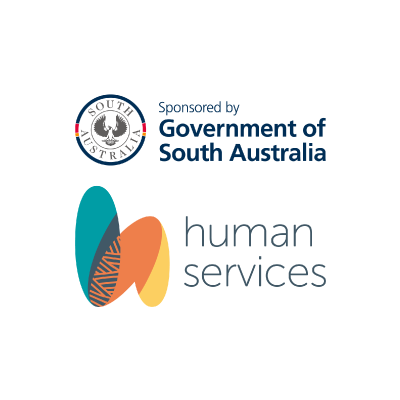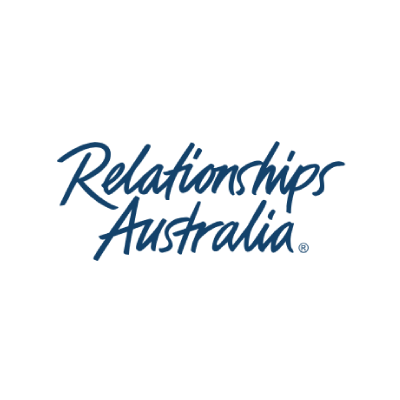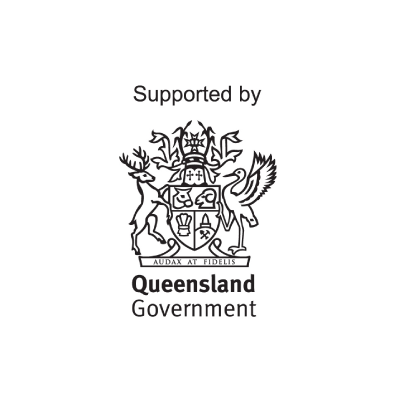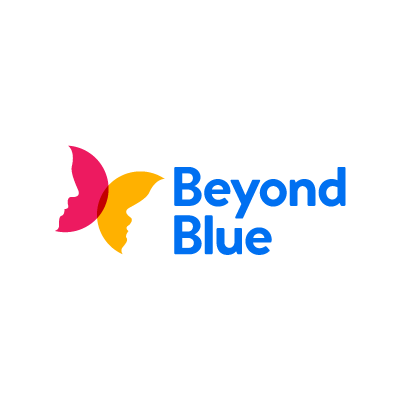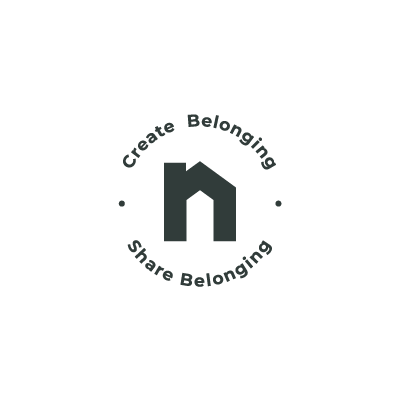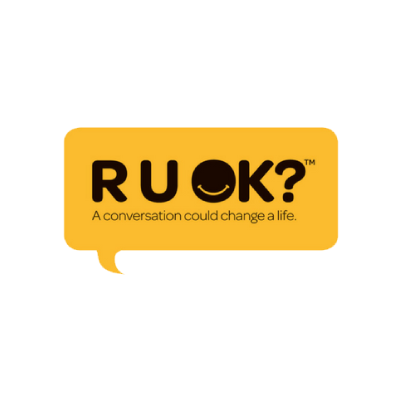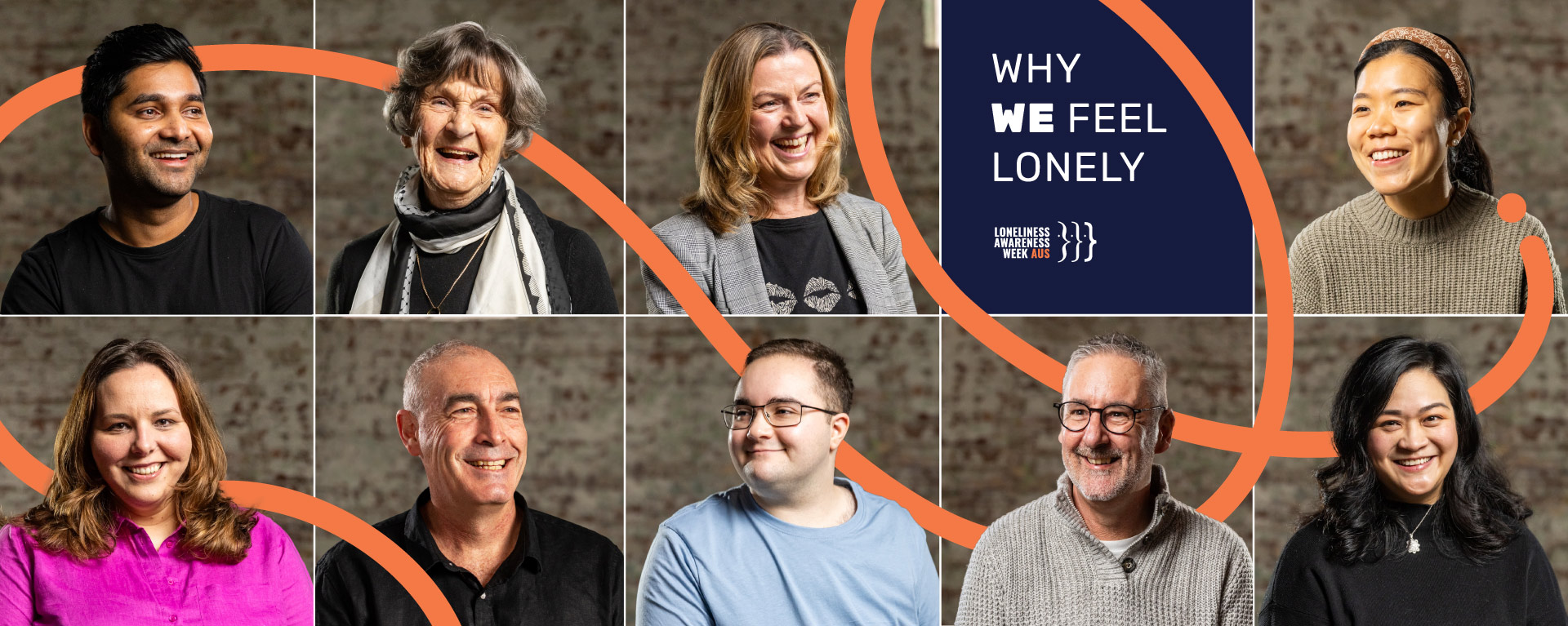
Loneliness Awareness Week Australia
5 – 11 August 2024
1 in 3
Australians feel lonely at any given time
1 in 4
experience persistent
loneliness
Let’s talk about
why
Why we feel lonely
Our research and conversations with everyday Australians tell us that significant life changes and circumstances can contribute to feelings of loneliness and social isolation.
This Loneliness Awareness Week we’re sharing real stories to spark conversations about why we feel lonely and encouraging all Australians to create a culture of connection at home, work, school and in the community.
#EndingLonelinessTogether
#LonelinessAwarenessWeekAU
Meet
Greg
Original Yellow Wiggle, Greg, was frequently on tour and surrounded by people, but being away from family and friends was a lonely experience. After retiring and suffering a cardiac arrest he wanted to find a new purpose and meaning in his life which lead to the creation of Heart of Nation.
Meet
Sophia
Sophia experienced loneliness when she became a first-time parent. Navigating life in an unfamiliar role with a newborn and establishing different routines felt overwhelming and isolating. She shares how connecting with people going through similar life changes or experiences can form new friendships and help with challenging times.
Meet
Denise
Denise is in her late eighties and moved to a new home and city following the loss of her husband. Navigating familiar situations on her own and feeling like the odd one out among couples left her feeling lonely. For Denise, maintaining her connections and moving to a retirement village have made a difference.
Meet
Peter
Peter lives with a chronic illness which has impacted his ability to form and maintain connections at times. At first, he didn’t recognise he was feeling lonely, but once he understood what he was experiencing, he made a conscious effort to organise catch-ups with friends and visit places where he could interact with people.
Meet
Ana
Ana moved to Australia from Serbia, leaving her family and friends behind. While she was excited for the change, figuring out new social norms was challenging and lead to feelings of loneliness. Ana looked to strengthen bonds with her housemates as a first step.
Meet
Will
Will moved from a small primary school where everyone knew one another, to a large high school with over one thousand students. He reflects on his experience of loneliness and how this impacted his self-esteem. Now a university student, Will has found some online communities helpful in making connection.
Meet
Kiki
Kiki is an international student from China. Moving to a new country, losing her dog and being away from her family heightened her feelings of loneliness. She has found ways to make new connections in Australia by focusing on her interests and joining groups around those.
Meet
Joe
Joe is an ex NRL player. Loneliness affected Joe as a player when he made a difficult career choice. He shares how athletes are everyday people who face struggles and thrive with meaningful connections.
Meet
Tara
Tara is a paramedic and experienced loneliness when she was diagnosed with Complex Post Traumatic Stress Disorder (PTSD). She found herself withdrawing from colleagues and other supports in her life, which made her feel more isolated. Tara encourages people to check in with colleagues and loved ones if you feel they might be going through something difficult.
Meet
Michelle
Michelle is a mum of neurodiverse children. She shares her family’s experience of loneliness as they navigated systems and environments that were not inclusive. Michelle’s experiences led her to develop an online app, Kaboose, to support neurodiverse young people in establishing and maintaining friendships.
Meet
Chai
Chai worked multiple jobs at home to support himself financially, which left little time to connect with family and friends. Now, he focuses on maintaining work-life balance and his friends hold regular board game nights to stay connected.
Meet
Clint Stanaway
As a TV presenter and radio host, Clint Stanaway is often surrounded by people. When he moved to a new city for work, he felt disconnected and unsure how to navigate and connect in a new community. He shares how talking about his experiences openly helped him to take steps towards building connections.
Meet
Chase
Chase experienced loneliness as he transitioned from high school to university. After establishing strong friendships during high school, everyone went their separate ways, and the move to university meant he had to develop new connections which felt like starting over again.
Meet
Clint Newton
Clint is the CEO, Rugby League Players Association. He shares his personal journey of retirement and the loneliness he felt, which many athletes face during the significant change. Clint believes sporting communities must create a safe space for people to be themselves to foster connection.
Exploring persistent loneliness and social isolation in Australia.

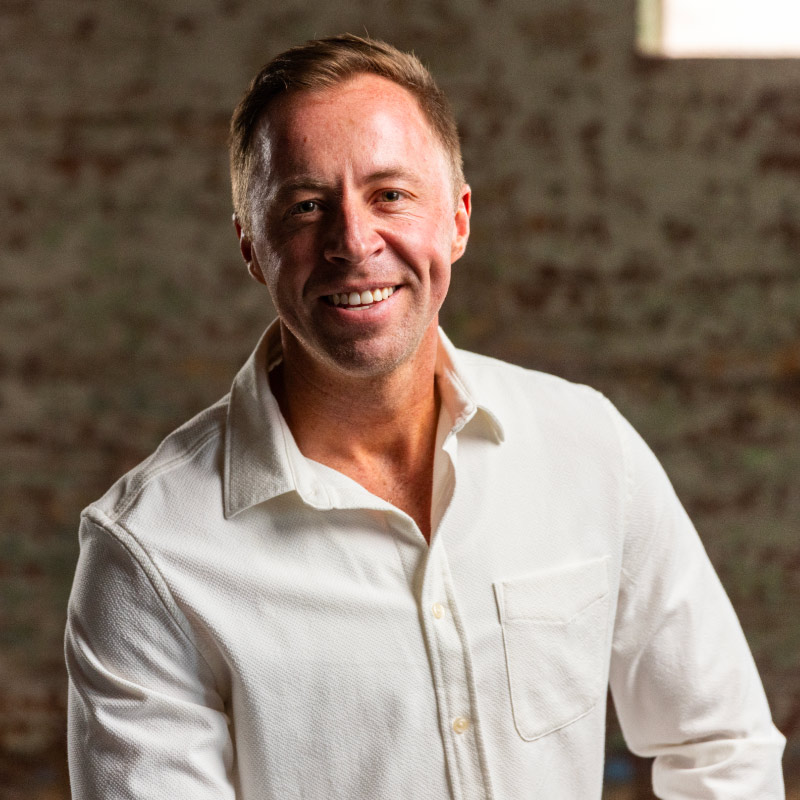

A deep dive into how different life circumstances contribute to persistent loneliness and social isolation
We all may feel lonely from time to time, but some of us stay lonely for longer.
Last year, our State of the Nation Report shared insights into who experiences loneliness and how it impacts our health and wellbeing. This year, our report dives a little deeper, exploring different life circumstances that can contribute to persistent loneliness and social isolation. Understanding this is crucial in developing initiatives that promote meaningful social connections across the lifespan and prevent the significant health impacts of lasting loneliness.
Ending Loneliness Together CEO, Associate Professor Michelle Lim explains loneliness and social isolation, and the role we all play in creating opportunities for meaningful social connections.
We can all create opportunities for Australians to build meaningful social connections. Take action this week by implementing one or more of the initiatives below, or invent your own! Share on social media using #EndingLonelinessTogether.
HOME/ FAMILY
Home is a great place to strengthen existing bonds.
- Digital free dining – have dinner with your partner, family, friends or housemates without devices at the table
- Schedule a chat – if family or friends are busy or live abroad, schedule a facetime call
- Cook together – write down your favourite meals and put them in a bucket. Choose one each night to prepare and eat together
- Chat to your neighbours – do more than wave and make the time to chat to your neighbours
- Street play for children – organise playgroups for your children and meet up with parents and families in the neighbourhood and, or your school communities. Download a free guide by Neighbours Every Day and Play Australia.
SCHOOL/ UNIVERSITY
School, university and tertiary education settings can create a safe space for students to talk about loneliness and build meaningul social connections.
- Learn together – download our free primary and secondary school lesson plans exploring loneliness and meaningful social connections
- Get creative – encourage students to write a poem, draw a picture or make a poster about the importance of connection. Send your masterpieces to info@endingloneliness.com.au
- Celebrate cultural diversity – embrace different cultures by learning about each other through food, stories, traditions and customs.
WORK
- Meaningful meetings – start meetings with a check in question (What did you do on the weekend? What’s the highlight of today/ this week?) and finish with a check out question (How is your work going? Is there anything you need support with?)
- Know the signs of loneliness – download our Understanding Loneliness Pack
- Host an in-person gathering – bring staff together to connect/ re-connect. Organise a set day in the office, or team bonding activities chosen by staff
- Celebrate cultural diversity – learn about colleagues’ cultural backgrounds and traditions by creating the space and time to celebrate important days
- Introduce a buddy system – match new starters with existing staff to help them ease into a new environment and form connections in the workplace.
| CREATE A CONNECTED CREW |
| Ending Loneliness Together, together with AIA, has developed an evidence-informed practical workplace training program that helps employers and employees build and maintain meaningful relationships in a blended working environment, while also recognising and responding to loneliness in colleagues. |
| Find out more |
HEALTH
Healthcare workers are in a unique position to recognise the signs of loneliness and respond to support meaningful social connections.
- Know the signs of loneliness – watch our Understanding Loneliness short video or complete accredited Pharmacist Training by Pharmacy Addressing Loneliness and Social-isolation (PALS) in partnership with Pharmaceutical Society Australia.
- Ask targeted questions – consider people’s life circumstances when providing or referring to care options
- Be a connector to social resources – our online national directory lists groups, organisations and services in local areas
- Look after yourself – healthcare workers also experience high levels of loneliness. Download our self-care toolkit.
COMMUNITY
Local councils and services serve a diverse community, all requiring connection to thrive.
- Normalise conversations about loneliness – feature our real story videos on community pages and websites, spotlight books in libraries about loneliness and connection
- Host free local events – bring local community members together by celebrating cultural days, holding food events and hosting activities for different interests such as community gardens, craft, pet play, markets etc
- Create safe spaces for connection – such as parks with seating, shaded areas, playgrounds, games areas, common spaces in shopping centres, libraries, and recreation/ leisure centres
- Use our Conversation Starters – hospitality workers, reception workers, hairdressers, cashiers and other front-of-house staff interact with people every day, and often have regular customers. Download our Conversation Starters to start meaningful chats with customers during the week
- Be a connector to social resources – promote local events and regular social activities so that people are aware of them.
-
INDIVIDUALS
There are steps we can take to build meaningful connections in our life.
- Recognise loneliness as a sign to connect – it’s ok to feel lonely, it’s our body’s way of telling us our need for connection isn’t being met
- Build on small talk – with neighbours, colleagues, local service providers and your community. Our Conversation Starters can help
- Nurture current relationships – you don’t have to make a new friend to feel less lonely. Spend more quality time with the people in your life
- Join an interest group – think about your interests and values and join groups that align with these. Our online directory is a good place to find local volunteering or low-cost opportunities
- Try volunteering – volunteering provides an opportunity to connect with others through a shared cause.
PARTNERS
PARTNERS
Thank you to our partners, sponsors, supporters and members who are taking steps to raise awareness of loneliness and support all Australians in building meaningful social connections.
Bolton Clarke
Bolton Clarke has been caring for Australians since 1885 and today supports more than 130,000 people at home and in their 38 retirement villages and 87 residential aged care homes. Their programs and services support connections with families and communities.
AIA
As an insurer, AIA is helping raise awareness by educating communities about the impacts of loneliness on health, wellbeing and productivity, and encouraging Australians to take steps towards building meaningful social connections.
Fraser’s Property
Since 1924, Frasers Property has worked to ensure the communities they create leave a positive environmental and social legacy. As part of this culture, they sponsored the creation of The Great Separation, a ground-breaking documentary exploring the causes, impacts and solutions to loneliness.
PHILANTHROPIC PARTNER
PHILANTHROPIC PARTNER
SPONSORS
SPONSORS
SUPPORTERS
SUPPORTERS
ENDING LONELINESS MEMBERS
Thank you to our members who help people build meaningful social connections every day.
